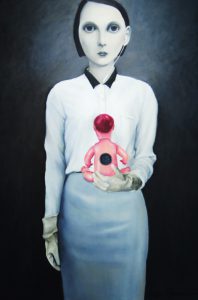
The Cornell Art Museum
With appreciation for W. H. Auden
About Tech they are never wrong, the Cornell artists;
how well they understand its electronic impositions,
how Tech’s control surreptitiously springs from luminous screens
while someone is shopping
or steering a car
or mumbling monotonously at night.
How, when the susceptible are senseless to penetration
there must be in the dark banks of hard drives in distant servers,
their lights blinking,
that unfeeling energy that makes Tech rule.
In Ellen de Meijer’s “Back Up,” for instance,
how freedom surrenders to society’s circuits;
how purity is commodified and disciplined in directories;
how the tasered, rubber-gloved mother is numb to her plastic baby;
how the dilated eyes in the elliptical face are as disturbing as data;
how the faceless, pink, and red-haired child,
an Oreo fused to its back and functioning as a speaker,
turns quite mechanically from sensation;
and the looming gray wall,
which must see something inspiring,
maybe Nature, Evolution, or even God,
stands flatly mute and motionless behind.
What Contest Judge Stephen Gibson says: “This poem is, by its own suggestion in the epigraph, at once an homage to Auden’s “Musee des Beaux Arts” and a visceral reaction to de Meijer’s enigmatic work. In responding to de Meijer’s piece, it echoes Auden’s structure by first presenting commentary on the human condition as seen through other artists (Auden: “About suffering they were never wrong / The Old Masters”; this poem: “About Tech they are never wrong, the Cornell artists”), before centering upon the work at hand, which this one does with wonderful particularity, tying detail from de Meijer’s work to its response in the poem’s author (e.g., “how the tasered, rubber-gloved mother is numb to her plastic baby” ), resulting in a powerful interpretation of de Meijer’s piece.
William Lawlor, also known as Bill or Liam, is a recipient of a Literary Arts Fellowship from the Wisconsin Arts Board and a summer study grant from the National Endowment for the Humanities. His original poems and his translations of four Caribbean poets appear in his book, Let’s Go Down to the Beach (Poetry Harbor). He and his wife live in Pembroke Pines, Florida.
